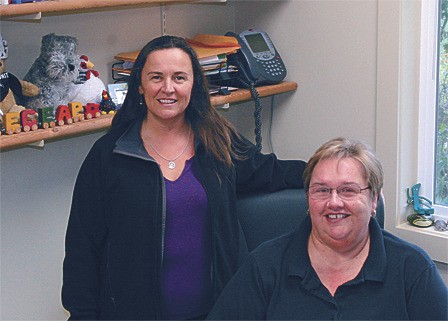The state-funded ECEAP program is a silent savior for Orcas kids, working behind the scenes and beneath the radar to support our island’s littlest ones – and their families.
“We’ve given hundreds of thousands of dollars to Orcas pre-schools over the years,” said director Sage MacLeod. “I do not want to see this program go away. I will give as much time and energy as I can at the state level to show how important this program is to rural communities. If the state cuts our budget, the loss of ECEAP funding could result in some of our local preschools having to close their doors.”
The Early Childhood Education and Assistance Program (ECEAP) and Head Start provide free services and support to eligible pre-school children and their families. The goal of both programs is to help ensure all Washington children enter kindergarten ready to succeed. San Juan County’s ECEAP serves Orcas and Lopez, while San Juan Island has Head Start, which is federally funded.
ECEAP has three primary functions: provide preschools services to children, assist families with everyday problem-solving and parenting issues, and encourage high quality teaching, programming, and safe facilities at the locally contracted preschools.
“Most years, our (preschool) program is completely full with a waiting list by the end of August,” MacLeod said. “We advertise entirely by word of mouth. Parents spread the word.”
This year, ECEAP is spending $118,000 to send Orcas kids to preschool and $32,000 for Lopez children. Because of this state-funded program, a total of 38 kids will be receiving an early childhood education.
“As our population is growing, we need more funding,” MacLeod said. “We’ve been very lucky: we haven’t had any budget cuts, but we still don’t have enough … In today’s society, children receive so many benefits from having a high quality preschool experience … it establishes their path toward a lifetime of success. This opportunity should be an absolute right available to all of our children.”
MacLeod, who runs the program from an Orcas office at the senior center, is active in Olympia. She is also a representative for the Washington State Association of ECEAP and Head Start.
“I represent all five rural ECEAP programs in Washington,” she said. “I keep lobbyists and legislators informed about how important early childhood education is and advise the Department of Early Learning as changes are suggested and made to ECEAP.”
To qualify for preschool scholarships, families need to be low-income and/or have “stressors” or a special needs child. MacLeod says most of the children they see come from families with two parents. They are usually between 20 and 40 years old, and work service jobs that don’t pay enough to meet their children’s needs.
“Some say we are perpetuating the welfare mentality, but that’s not the case at all,” she said. “Ninety-five percent of my families have two parents who are working … and most of the families have something that is causing stress. Lack of finances is the basic problem, and it goes from there, stressors that can lead to poor choices. Most parents simply do the best they can and have happy, healthy families. However, there are those few who find relief by self-medicating.”
MacLeod says meth addiction is a growing problem on Orcas.
“We see the underbelly of things that happen on a daily basis,” she said. “Most people turn a blind eye – they don’t want to know that this happens on their island.”
Ethna Flanagan, the family support specialist for ECEAP, assists MacLeod by working with parents and making referrals to such organizations as Domestic Violence and Sexual Assault Services, OPAL Land Trust, and Orcas Family Connections (OFC), which is Orcas Island’s resource center. Both Flanagan and MacLeod have volunteered with OFC since its inception in 2004.
“We donate as much time to OFC as we put in for our paid time at ECEAP,” MacLeod said.
Adds Flanagan, “There is so much cross-over.”
Thanks to a United Way grant, Flanagan recently helped staff from the Orcas Family Health Center organize “Well Child Checks” for island kids. They received check-ups from Dr. David Shinstrom’s medical staff and dental care from Dr. Steven Bailey, all free of charge.
ECEAP has been in existence for 27 years on Orcas, but MacLeod says most people aren’t aware of what they do – which is part of the program’s appeal. By flying under the radar, many feel they can use their services without the community knowing.
“Some of our families are newly poor,” Flanagan said. “And they are the ones crying in our offices because they are humiliated to be applying for OPALCO’s energy assistance program.”
Orcas Family Connections board
MacLeod and Flanagan say Orcas Island’s resource center, called Orcas Family Connections, is in desperate need of board members.
To join, call Erin O’Dell at 376-5780 or Ethna Flanagan at 370-0593.



